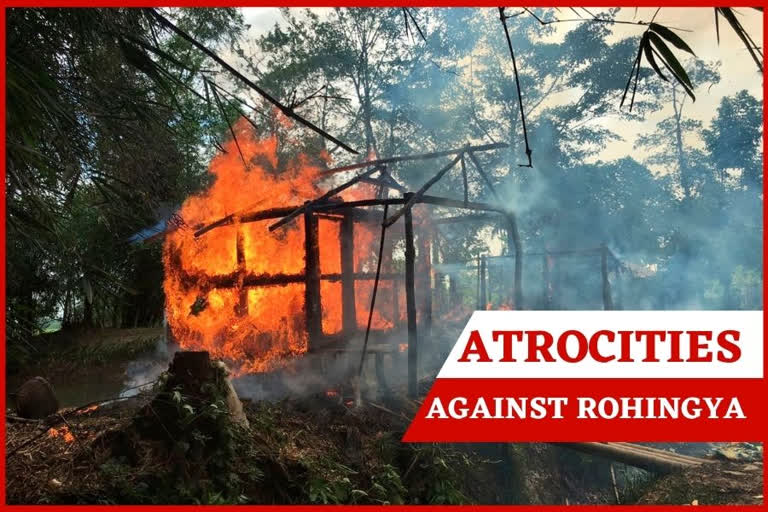Bangkok: Two soldiers who deserted from Myanmar’s army have testified on video that they were instructed by commanding officers to 'shoot all that you see and that you hear' in villages where minority Rohingya Muslims lived, a human rights group said Tuesday.
The comments appear to be the first public confession by soldiers of involvement in army-directed massacres, rape and other crimes against Rohingya in the Buddhist-majority country, and the group Fortify Rights suggested they could provide important evidence for an ongoing investigation by the International Criminal Court.
More than 7,00,000 Rohingya have fled Myanmar to neighbouring Bangladesh since August 2017 to escape what Myanmar’s military called a clearance campaign following an attack by a Rohingya insurgent group in Rakhine state. Myanmar's government has denied accusations that security forces committed mass rapes and killings and burned thousands of homes.
Fortify Rights, which focuses on Myanmar, said the two army privates fled the country last month and are believed to be in the custody of the International Criminal Court in the Netherlands, which is examining the violence against the Rohingya.
According to Fortify Rights, privates Myo Win Tun, 33, and Zaw Naing Tun, 30, who served in separate light infantry battalions, gave “the names and ranks of 19 direct perpetrators from the Myanmar army, including themselves, as well as six senior commanders ... they claim ordered or contributed to atrocity crimes against Rohingya."
The videos were filmed in July while the soldiers were in the custody of the Arakan Army, an ethnic guerrilla group in Rakhine engaged in an armed conflict with the government, and included subtitled translations into English, the human rights group said. They were posted on Fortify Rights' page on a video-sharing site, where the Associated Press viewed them.
The AP was not able to independently corroborate the soldiers’ accounts or ascertain whether they made their statements under duress.
However, UN agencies and human rights organizations have extensively documented atrocities carried out against the Rohingya by Myanmar security forces. The International Court of Justice agreed last year to consider a case alleging that Myanmar committed genocide against the group. The court’s proceedings are likely to continue for years.
Read more:China, Myanmar agree to speed up infrastructure projects
Myanmar has long considered Rohingya Muslims to have migrated illegally from Bangladesh, even though their families have lived in Myanmar for generations. Nearly all have been denied citizenship since 1982, effectively rendering them stateless. They are also denied freedom of movement and other basic rights.
In separate videos, the two soldiers were shown seated stiffly in military uniforms with a sheet covering the background, as an off-screen male voice asked them questions. The details in the questions, as well as the ready answers about events that occurred about three years earlier, made it evident the content was prepared, if not actually rehearsed.
However, the violent acts the men described echoed the vast number of accounts of atrocities collected by UN investigators and independent human rights workers from Rohingya refugees in Bangladesh.
After answering questions about his name, serial number and military units, Myo Win Tun said the commander of the 15th Military Operations Center, whom he named as Col. Than Htike, gave an order to “shoot all you see and all you hear” when raiding Muslim villages. He said in one operation, they killed and buried 30 people: “eight women, seven children and 15 men and elderly.”
He asserted that Col Than Htike ordered his unit to 'exterminate all Kalar' a derogatory name for the Rohingya and that they shot the men in their foreheads and kicked their bodies into a hole. They also raped the women before killing them and he admitted to carrying out one rape.
He said his unit appropriated mobile phones and laptops, and also seized cattle, an allegation that has been widely reported.
Staring directly at the camera with barely any perceptible movement, Zaw Naing Tun recounted how his unit 'wiped out' 20 Rohingya villages.
